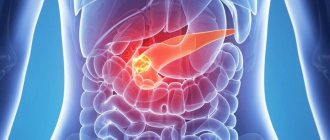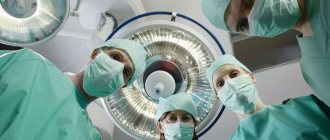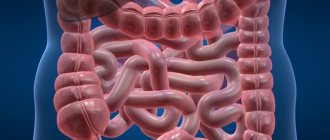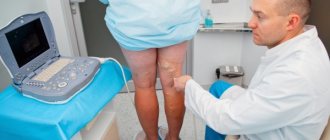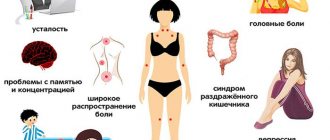Why does my stomach constantly hurt?
Some people have stomach pain every day for weeks, months, or even years.
In such situations, acute pathology requiring emergency surgical intervention is excluded. Various diagnostic methods are used, from routine ultrasound and blood tests to complex radiological studies designed to find the true cause of frequent abdominal pain.
Candidates for this role may include:
- Inflammatory diseases of the colon;
- Irritable bowel syndrome;
- Adhesive disease;
- Organic gynecological pathology;
- Tumor neoplasms of the abdominal organs;
- Chronic infections.
Medicines for stomach pain
Medicines to relieve stomach pain should be prescribed by a doctor. However, it is not always possible to immediately get an appointment with a specialist.
You can choose your own medicine based on the symptoms of the disease:
- If the pain is caused by an ulcer, exacerbation of gastritis or increased acidity of gastric juice, and is also accompanied by a burning sensation and belching of acidic contents, then you can take the following drugs: De-nol, Gastal, Antacid, Almagel, Flacarbin.
- If pain occurs due to errors in nutrition, or after overeating, then you can take the following medications: Mezim, Gastromax, Omeprazole, Cimetidine.
- You can relieve spasms from the gastric wall by taking the following medications: Besalol, No-shpa, Buscopan.
- If a person has gastritis with low acidity of gastric juice, or indigestion, then you can take Festal, Pancreatin, Panzinorm, Creon or Triferment.
Inflammatory diseases of the colon
This group includes two main diseases - ulcerative colitis and Crohn's disease , which have similar development mechanisms, clinical picture and prognosis. As a rule, the first signs of these pathologies appear at a young age (up to 30 years):
- Constant abdominal pain that may wax and wane;
- Loose stools mixed with blood, pus and mucus;
- Increased body temperature;
- General weakness, malaise;
- Pain in the joints.
Ulcerative colitis and Crohn's disease have several variants of the clinical course. Some patients suffer from frequent relapses, between which intestinal function is restored almost completely. In others, the disease becomes persistent and manifests itself as permanent abdominal pain and a rapid deterioration in general condition.
Pain. Warns and protects.
Who among us does not know what pain is? Everyone has experienced pain at least once in their life. Defining pain is not so difficult; it does not require sifting through a mountain of medical literature or looking too deeply into medical reference books. When a person is in pain, he suffers, and the only thought that always comes to him and in all situations when pain appears is a desperate desire for it to go away as soon as possible. And she never appeared again. But, alas, there are no miracles in the world, and no matter how much we want it, she always comes back. Sometimes more often, sometimes less often. Every minute, millions of people around the world take painkillers. Humanity consumes tons of analgesics every day. Every year, more and more advanced drugs are being developed and created around the world that “relieve this pain as if by hand.” It seems quite reasonable to us that we give pain a proper rebuff at its first appearance. Have you ever thought, even for a moment, whether the appearance of pain is so accidental? Is it as evil as we think? Remember school, a biology textbook that said that “pain is a vital function of our body that warns us of danger.” There is no pain that is safe, that can be ignored. Nature has built into us certain irritants; when the pain threshold is exceeded, they give the body a signal of danger.
Irritable bowel syndrome
This “mysterious” disease rightfully belongs to the category of psychosomatic, since even with the most thorough examination, doctors do not detect any significant changes in the intestinal wall. However, IBS, as this pathology is otherwise called, causes great inconvenience, including:
- Frequent abdominal pain of a spastic nature (sometimes unbearable);
- Tendency to constipation or diarrhea;
- Deterioration in general health.
IBS likes to develop against an already prepared psychological background. Indeed, the vast majority of such patients have certain individual characteristics, such as emotional lability, anxiety, nervousness, self-doubt, and a tendency to experience vivid emotions within themselves.
Often the first signs of the disease appear in childhood, since the child is more prone to “internal” experiences.
Treatment of irritable bowel syndrome is very difficult and long-term, and often includes the prescription of strong antidepressants and complex psychotherapy.
Providing first aid for stomach pain
To get rid of stomach pain, you can take a pain reliever. You should also not eat at this time. It is better to replace food with low-fat broth and warm drinks.
Depending on the situation, the following recommendations may help:
- If a person has an exacerbation of chronic gastritis, then you need to lie on your side and bring your knees to your stomach. You can also lightly massage the epigastric area and apply a cold compress to it. If this does not help, then it is necessary to induce vomiting by first drinking a sufficient amount of water.
- If a person has suffered from poisoning of the body, then you can take activated carbon or some other sorbent drug. Be sure to drink water to prevent dehydration.
Adhesive disease
It develops in almost all patients who have had surgery on the abdominal or pelvic organs. During such a surgical intervention, the peritoneum is inevitably irritated, limited areas of inflammation arise, which is why the organs seem to “stick” to each other - adhesions are formed.
These adhesions interfere with normal intestinal motility, disrupt the natural anatomical arrangement of organs, which causes constant abdominal pain. This is a typical situation after open gynecological operations - adhesions form in the pelvic cavity, and the patient experiences frequent pain in the lower abdomen, urination problems and other symptoms.
When is pain considered normal?
In some cases, pain can be physiological, that is, caused by natural processes occurring in the body. So, during pregnancy, a woman may have a stomach ache for longer than two weeks as a result of:
- abdominal muscle strain;
- tension of the ligaments supporting the uterus;
- pressure of the growing uterus on adjacent organs;
- relaxation of smooth muscles due to the effects of the pregnancy hormone (progesterone);
- eating incompatible foods.
But physiological pain should be distinguished from pathological pain, since a pregnant woman can have a stomach ache during an exacerbation of chronic processes, the threat of miscarriage and premature birth, or placental abruption. It is considered normal to feel soreness for a couple of weeks after giving birth. During this period, the uterus should shrink to its previous size.
Long-lasting discomfort caused by natural causes can occur in women before menstruation
After the birth of a child, the walls of the uterus are a wound surface with bleeding vessels. If the delivery was carried out by cesarean section, then the contraction of the uterus occurs at a slower pace, and additional pain occurs due to the fact that the walls of the abdominal cavity and uterus were dissected.
But if, in addition to pain, additional symptoms occur, for example, nausea, body temperature rises, intoxication syndrome develops, there is discharge, suppuration of the suture, prolonged constipation, then this is a sign of pathological processes (endometritis, symphysitis).
Newborn babies may experience intestinal colic caused by the accumulation of gas. The fact is that the intestines of small children are not fully formed, so they cannot function fully. Physiological pain does not require medical intervention, since the pain goes away on its own. If the pain is severe, your doctor may prescribe medications to relieve symptoms, such as antispasmodics, heartburn medications, and carminative medications.
Organic gynecological pathology
If a woman complains of frequent pain in the abdominal cavity, and especially if the discomfort is localized in the lower parts, then first of all it is necessary to exclude gynecological and urogynecological pathology. These include:
- Endometriosis , or the appearance of modified uterine glands outside the uterus. All the same changes occur in them as with the endometrium during the menstrual cycle. Over time, endometriosis lesions develop into large cysts filled with clotted blood (“chocolate cysts”) that must be removed surgically.
- Endometritis , or inflammation of the lining of the uterus. It can occur as a complication after childbirth, during interventions in the uterine cavity, sexually transmitted diseases, and during the installation of an intrauterine device. Endometritis is manifested by constant nagging pain in the lower abdomen and perineum, frequent urge to go to the toilet, fever, and malaise. Without treatment, this disease is guaranteed to lead to infertility.
- Uterine fibroids are a benign neoplasm of smooth muscle cells that build the myometrium, or the muscular lining of the organ. Fibroids can reach colossal sizes, squeezing surrounding tissues, which can cause constant pain, especially in middle-aged women.
There are other pathologies that long-term disrupt the patient’s quality of life. To identify them, you need to undergo a thorough diagnosis by an experienced gynecologist.
When to see a doctor
If the pain, even if not very severe, continues after several hours, contact your doctor. Such persistent discomfort can manifest itself, for example, in developing appendicitis.
You should also urgently consult a doctor if Stomach Ache:
- pain intensifies;
- abdominal pain or bloating does not stop or occurs again and again day after day;
- the urge to urinate began to appear much more often or less frequently than before;
- it hurts when urinating;
- you are a woman and experience bloody or unusually heavy vaginal discharge;
- diarrhea, which is accompanied by pain, does not go away within a couple of days;
- The pain has appeared because you have been losing weight inexplicably lately.
Tumor neoplasms
You should never forget that frequent and constant pain in the abdominal cavity can accompany the oncological process. Although in most cases the tumor does not make itself felt for a long time, some cancers already in the early stages manifest themselves in severe pain (for example, pancreatic and stomach cancer).
Oncology should be excluded in middle-aged and older patients who complain of prolonged abdominal discomfort, decreased appetite, nausea, low-grade body temperature, weight loss and the appearance of a “bump” in the abdomen. Cancer may be indicated by blood in the stool, changes in the shape of stool (band-shaped), intestinal obstruction, and other symptoms.
Pain exactly in the middle of the abdomen
There is a feeling of bloating, the presence of excess gases, the stomach is seething, an aching feeling and short-term cramps appear. Possible causes of pain are banal overeating. The digestive organs cannot cope with the flow of food. As a result, a lot of gases are formed, moving through the intestinal tract and causing discomfort.
Dysbacteriosis and lactose intolerance can also cause cramps in the middle of the abdomen.
What to do
Pharmacies sell many medicines containing enzymes. They will quickly help cope with large amounts of food and restore intestinal microflora.
Chronic infections
In this group of pathologies, first of all, helminthic infestations , which include ascariasis, taeniasis, teniarinchiasis, diphyllobothriasis, fascioliasis, opisthorchiasis and many others. These diseases can last a very long time, manifesting themselves with the most minor symptoms - constant discomfort in the stomach, nausea, periodic loss of appetite.
Some patients develop allergic reactions (attacks of bronchospasm, skin rash) against the background of helminth infections.
Among other infectious diseases, yersiniosis, pseudotuberculosis, amoebiasis, cytomegalovirus infection and many others have a chronic course. The clinical picture of these diseases is very different, but all of them can be accompanied by constant unpleasant sensations in various parts of the abdomen.
Diagnostics
When a patient consults a doctor with a complaint of abdominal pain that lasts more than a week, the doctor must carefully collect anamnesis. The patient is asked questions about the nature of the pain, its intensity, when it intensifies and what helps to eliminate it; it is found out whether the patient himself or his immediate family has chronic diseases.
They also ask in detail about the presence of additional symptoms (vomiting, belching, nausea, bowel dysfunction, heartburn). During a physical examination, a general assessment of the condition is given (pressure, pulse, body temperature are measured), examination of the oral cavity, palpation, percussion and auscultation are performed.
Based on the examination, the doctor can assume the presence of a certain pathology. Thus, with yellowing of the skin and sclera, rashes on the skin, there is a high probability of liver or gall bladder disease; with splashing in the stomach, a violation of the evacuation function is suspected; asymmetry of the abdomen is noticeable with intestinal or stomach obstruction.
To confirm the diagnosis, the patient is also prescribed a laboratory test (it is necessary to take urine, feces, and blood tests) and instrumental tests, which may include:
- Ultrasound of the abdominal organs;
- fibrogastroscopy;
- colonoscopy;
- fluoroscopy with contrast;
- irrigoscopy;
- magnetic resonance imaging;
- computed tomography.
If there is colic, the baby is given symptomatic therapy, which is aimed at removing gases.
Sometimes one study is enough to clarify the diagnosis, and sometimes several are required. So, to make a diagnosis of “gastritis”, it may be necessary to perform only fibrogastroscopy, and to identify liver diseases and the stage of the pathological process, sometimes it is necessary to perform an ultrasound, CT or MRI, or a biopsy of the gland.
